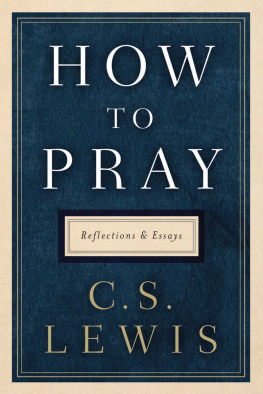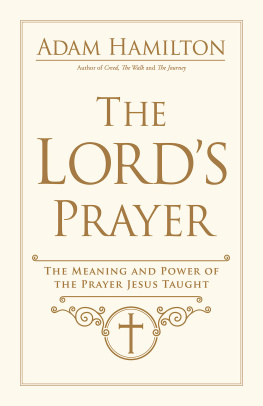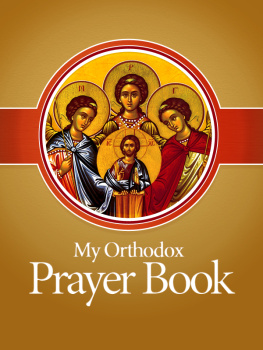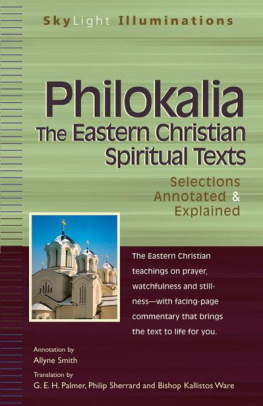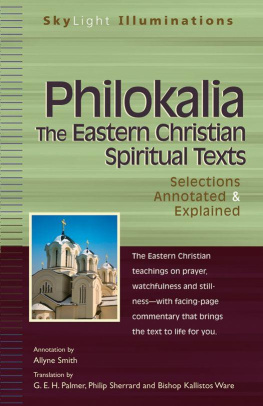AN INNER STEP TOWARD
GOD
WRITINGS AND TEACHINGS ON PRAYER BY
FATHER ALEXANDER MEN
EDITED AND INTRODUCED BY APRIL FRENCH
TRANSLATED BY CHRISTA BELYAEVA

2014 First Printing
An Inner Step Toward God: Father Alexander Mens Writings and Teachings on Prayer
Copyright 2014 by The Alexander Men Foundation (Russia)
ISBN 978-1-61261-238-6
Scripture quotations are taken from the New King James Version. Copyright 1982 by Thomas Nelson, Inc. Used by permission. All rights reserved.
Unless otherwise noted, excerpts of Orthodox Prayers are taken from the website of the Orthodox Church of America: http://oca.org/orthodoxy/prayers .
Translated with permission from The Alexander Men Foundation, Moscow.
This book is a translation of major selections from:
Protoierei Aleksandr Men. Prakticheskoe rukovodstvo k molitve. Second expanded edition, with the blessing of His Eminence Yuvenaly, the Metropolitan of Krutitsk and Kolomna. Moscow: Fond imeni Aleksandra Menia, 1995.
The Paraclete Press name and logo (dove on cross) are trademarks of Paraclete Press, Inc.
Library of Congress Cataloging-in-Publication Data is available.
10987654321
All rights reserved. No portion of this book may be reproduced, stored in an electronic retrieval system, or transmitted in any form or by any meanselectronic, mechanical, photocopy, recording, or any otherexcept for brief quotations in printed reviews, without the prior permission of the publisher.
Published by Paraclete Press
Brewster, Massachusetts
www.paracletepress.com
Printed in the United States of America
INTRODUCTION
FATHER ALEXANDER MEN
AND PRAYER
FATHER ALEXANDER MEN (19351990) WAS A RUSSIAN Orthodox priest in three parishes outside Moscow from 1960 to 1990. He wrote and spoke this book into being during the last fifteen years of his life.
Despite many dangers, Father Alexander maintained a ministry in the Soviet Union during the rules of Nikita Khrushchev, Leonid Brezhnev, Yuri Andropov, Konstantin Chernenko, and Mikhail Gorbachev. The KGB (Soviet secret police) and the Council for Religious Affairs often called him in for interrogation, especially during the Brezhnev and Andropov years. Only in the last three years of his life was he able to take advantage of newfound freedoms under Gorbachevs glasnost (openness) to lecture to thousands of people in halls across Moscow and to speak on radio and television. He felt an urgent need to communicate the gospel message to people before the authorities were to clamp down on religious freedoms once again. Father Alexander was murdered on September 9, 1990. His murder is still unsolved, but many consider him a martyr.
A self-taught religious scholar at a time when works of a religious nature were scarce and often illegal, Father Alexander published many of his books under pseudonyms. Through his writings, he intended to draw his fellow Soviet citizens to consider faith in Christ. Throughout the late Soviet period, people circulated his books through the clandestine literature networks of samizdat These works are a tour de force of scholarly erudition, making use of both older, respected sources and some of the most recent scholarship available in the world at the time.
In addition to scholarly works, Father Alexander wrote works of spiritual instruction for Orthodox believers, many of whom were new to the faith. His three-part series Life in the Church includes writings on the Church, Scripture, and prayer.A Practical Guide to Prayer, the second section of the book you now hold, was intended as the third in this series, but it also functions as a stand-alone, instructional guide.
In the late 1970s, Father Alexander created a network for his parishioners to meet on a regular basis in various parts of Moscow to study Scripture and biblical history. This model resembled the small groups that developed in some Western church circles around the same time. In the Soviet Union, however, such gatherings were illegal, so participants needed to be careful to stagger their arrivals and exits from their hosts apartments, so as not to arouse suspicion. A few of these small groups gathered specifically to learn more about prayer. They utilized the original manuscript version of A Practical Guide to Prayer in the late 1970s and early 1980s. The book was not actually published until 1991, the year after Father Alexanders untimely death. The version here translated is the second expanded edition from 1995, which also includes some of Father Alexanders lectures, informal talks, and sermonsall of which were tape-recorded and later transcribed.
Throughout the text, you will encounter clues that point to the books original Soviet context. Father Alexander wrote with a Even spiritual seekers find Father Alexanders writing appealing. During his lifetime in the Moscow area, he was always considered highly approachable. His writing style reflects that accessibility, and his books helped many Soviet citizens (and continue to help many Russian speakers around the world) on their journey to faith and spiritual maturity.
Among the myriad books already published about prayer, there are several factors that make this one unique. First, Father Alexander has a gift of presenting his erudition in a simple, accessible way. In doing so, he offers practical, step-by-step advice on deepening ones prayer life. Second, he highlights the participation of ones psychosomatic nature (body and soul) while praying from the prayer book, in order to facilitate spiritual union with God. Third, the book provides exposure to prayers not commonly used in the West. As you read, you will acquire a unique glimpse into the Christian life and practice within Soviet Russia and, we hope, you will find in Father Alexander a true spiritual director with a deep and abiding faith in Jesus Christ.
This book originated in Father Alexanders own practice of prayer. In addition to his regular prayer rule, and often after having led an early morning matins service, he prayed every morning at 9 AM in He also corresponded with seasoned believers, providing exhortation for deepening their prayer. As you read, you will notice that Father Alexander took great delight in learning about prayer from the Christian traditionwhether from the early Church Fathers, from spiritual writers in the Russian and Eastern Orthodox Church, or from Western writers.
Father Alexander always viewed humanity through the lens of encounter. He believed that every person exists to have a personal encounter (vstrecha, also translated as meeting) with God, and that such encounters take place all the time. Many people, of course, do not realize that God is right there with them. Thus, they must learn to recognize their connection with God and to allow it to deepen and grow.
His ministry is best summed up with three words: courage, integrity, and presence. For the majority of his service to the Russian Orthodox Church, Father Alexander faced opposition to his messagewhether from the atheistic Soviet state, anti-Semites (Father Alexander was born into a Jewish family and baptized as an infant along with his mother, who had recently converted), the press, or anti-religious Soviet citizensyet, he continued to courageously preach the Good News of Jesus through his written and spoken ministry. His integrity is evident in that he lived what he wrote. He was a man who had a vital personal relationship with and deep trust in God. Despite his busy (at times, frenetic) schedule, he set aside regular time for focused prayer. His faith informed every aspect of his life and ministry. Many who knew him have attested to having felt highly valued when they were in his presence. Father Alexander was fully present to people and met people where they were.
Next page


